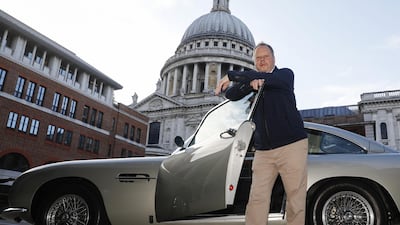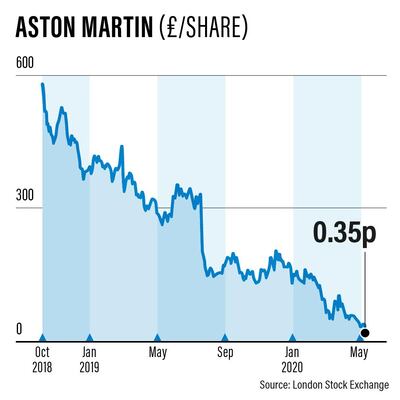Andy Palmer, the Nissan veteran who joined Aston Martin in 2014 to help revive the company, is leaving the classic brand made famous by James Bond movies as part of a management shake-up.
"My departure is immediate," Mr Palmer told The National by email, adding that he has no immediate plans.
Mr Palmer's departure was first reported by the Financial Times, who said the luxury carmaker will replace him with Tobias Moers, who runs the AMG performance arm of Mercedes-Benz.
An announcement about the changes will “be made as and when appropriate,” Aston Martin told Bloomberg following the newspaper's report on Sunday.
In 2014, the former No 3 executive at Nissan joined Aston Martin, which has been insolvent seven times in its 107 years in existence. Mr Palmer's mandate was to turn the company around as part of a seven-year plan that diversifies the car models produced and scales up the business across the globe.
Mr Palmer would build on his experience at the Japanese manufacturer, and import the lean monozukuri manufacturing principles across the corporate culture of Aston Martin.
However, as the car manufacturer went public on the London Stock Exchange in 2018, its share price did not immediately perform well and Mr Palmer said in an interview shortly after the debut with The National what mattered most was the long-term evolution of the company.
The company's shares have fallen nearly 94 per cent since its listing due to oversupply to its dealerships and a slowdown among luxury buyers.
Aston Martin reported a £119 million (Dh532m / $145m) loss in the first three months of 2020, in part because factories and dealers closed due to coronavirus pandemic.
Covid-19 and the resulting global economic shutdown "had a material impact on our performance this quarter but during this unprecedented time we completed a £536m capital raise and continued to implement our exciting strategy to reset and safeguard the long-term future of the business", Mr Palmer said in a regulatory filing announcing the results.
"Part of the reset includes reducing our global dealer inventory to a luxury norm to rebalance supply and demand, to build resilience and profitability for the future," he said.
"We have made significant progress on this with dealer inventory reducing by 428 units compared to the start of the year."
The US accounts for 30 per cent of the company’s total sales, followed by the UK. Europe and the Asia-Pacific region, which includes China, are closely behind in third and fourth place, respectively. The Middle East accounts for 10 per cent of the company’s sales.
Mr Palmer, who oversaw the Nissan Patrol that is widely popular across the Arab world, was bullish on promoting Aston Martin's Dh694,197 DBX 4x4 globally.
The DBX competes with rivals rolled out by Bentley, Lamborghini and Rolls-Royce. Ferrari, which Aston Martin considers its peer rival since it is the only other luxury company that is publicly listed, was according to pre-Covid plans set to release its Purosangue 4x4 in 2022.

In its first quarter disclosure Aston Martin said it can't give a clear view on the full-year outlook.
2020 was the year in which the business was being reset by reducing core wholesale revenue and rebalancing supply to demand. However, "the uncertainty surrounding the duration and impact of the Covid-19 pandemic on the global economy, makes it not possible to provide a clear view on the full year outlook and the company withdraws the previous guidance for the year", the company said.
Earlier this month Aston Martin said it assumes trading will remain challenging and it will implement measures to take further actions on operating costs and focus on conserving cash.
"Given the ongoing uncertainties, as is prudent, the company continues to review all future funding and refinancing options to increase liquidity," it said.



